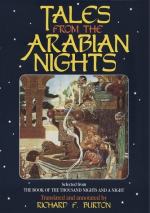[FN#259] This is a peculiarity of the Jinn tribe when wearing hideous forms. It is also found in the Hindu Rakshasa.
[FN#260] Which, by the by, are small and beautifully shaped. The animal is very handy with them, as I learnt by experience when trying to “Rareyfy” one at Bayrut.
[FN#261] She being daughter of Al-Dimiryat, King of the Jinns. Mr. W. F. Kirby has made him the subject of a pretty poem.
[FN#262] These lines have occurred in Night xxii. I give Torrens’s version (p. 223) by way of variety.
[FN#263] Arab. “Kamat Alfiyyah,” like an Alif, the first of the Arabic alphabet, the Heb. Aleph. The Arabs, I have said, took the flag or water leaf form and departed very far from the Egyptian original (we know from Plutarch that the hieroglyphic abecedarium began with “a"), which was chosen by other imitators, namely the bull’s head, and which in the cursive form, especially the Phoenician, became a yoke. In numerals “Alif” denotes one or one thousand. It inherits the traditional honours of Alpha (as opposed to Omega) and in books, letters and writings generally it is placed as a monogram over the “Bismillah,” an additional testimony to the Unity. (See vol. i. p. 1.) In mediaeval Christianity this place of honour was occupied by the cross: none save the wildest countries have preserved it, but our vocabulary still retains Criss’ (Christ-)cross Row, for horn-book, on account of the old alphabet and nine digits disposed in the form of a Latin cross. Hence Tickell ("The Horn-book"):
——Mortals
ne’er shall know
More
than contained of old the Chris’-cross Row.
[FN#264] The young man must have been a demon of chastity.
[FN#265] Arab. “Kirat” from i.e. bean, the seed of the Abrus precatorius, in weight=two to three (English) grains; and in length=one finger-breadth here; 24 being the total. The Moslem system is evidently borrowed from the Roman “as” and “uncia.”
[FN#266] Names of women.
[FN#267] Arab. “Amsa” (lit. he passed the evening) like “asbaha” (he rose in the morning) “Azha” (he spent the forenoon) and “bata” (he spent the night), are idiomatically used for “to be in any state, to continue” without specification of time or season.
[FN#268] Lit. “my liver ;” which viscus, and not the heart, is held the seat of passion, a fancy dating from the oldest days. Theocritus says of Hercules, “In his liver Love had fixed a wound” (Idyl. xiii.). In the Anthologia “Cease, Love, to wound my liver and my heart” (lib. vii.). So Horace (Odes, i. 2); his Latin Jecur and the Persian “Jigar” being evident congeners. The idea was long prevalent and we find in Shakespeare:—
Alas,
then Love may be called appetite,
No
motion of the liver but the palate.
[FN#269] A marvellous touch of nature, love ousting affection; the same trait will appear in the lover and both illustrate the deep Italian saying, “Amor discende, non ascende.” The further it goes down the stronger it becomes as of grand-parent for grand-child and vice versa.




